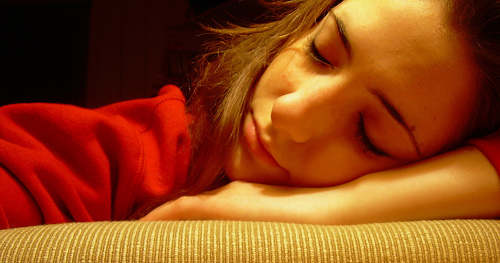
Image: 25/365 by ? maybe a mezzo ?
One more reason to take a nap: a new study reported by the University of California, San Diego School of Medicine suggests that REM sleep — also known as dreaming sleep— enhances creative problem solving. While this link has been established for some time (especially in regards to language ability), this study deserves attention because the researchers controlled for a couple key factors to help answer why dreaming encourages creativity.
Essentially, the researchers asked if REM sleep encourages creative connections due to unique ways that the brain operates in that state, or is because in REM sleep we are not interrupted by the distractions of waking life? In other words, is it really about creative thinking, or just a happenstance of environmental factors?
Or as Al Gore might say, “When dreaming, are we just putting our creativity into a lock box?”
Dreaming Encourages Unique Ways of Thinking
The design: The researchers had participants answer a creativity test about word associations after a good night’s sleep, after naps, and after quiet restful periods. The results showed 40% improvement in the test after REM sleep, suggesting that REM sleep actually fosters unique associations, compared not only to non-REM sleep but also waking consciousness. From the article at ScienceDaily:
“We found that – for creative problems that you’ve already been working on – the passage of time is enough to find solutions,” said Mednick. “However, for new problems, only REM sleep enhances creativity.”
The hypothetical agent of this unleashed creativity? Changes in the soup of neurotransmitters during dreaming sleep. For me, this finding hints at the possibility that REM sleep might have a (testable) evolutionary basis after all. This question is one of the central debates in sleep science: did dreams originate through evolutionary process or are they just applied creatively by humans after the fact?
I think in a way this proves that there is no such thing as common sense in science. We seem to have to prove everything now days in order to have some backing in real life. I always though that people knew that dreaming causes creative thought. What they should look into next is the chemicals behind REM and why those chemicals help to produce creativeness. It would be interesting to find out what those chemicals are.
Great post!
Lee, I’m with you about the absurdity of some studies. “science suggests that eating food is good for your health.” etc. the neurochemistry of creativity is a juicy topic indeed. (altho I shiver at the invention of a “creativity pill” that may result once the formula is known). however, knowing how to increase creativity through dreams and dream incubation is something that our dream-phobic society could really benefit from.